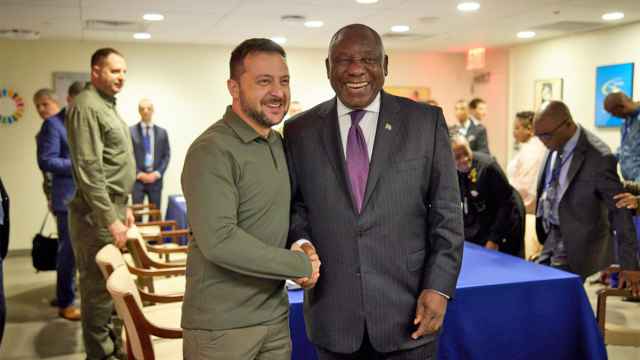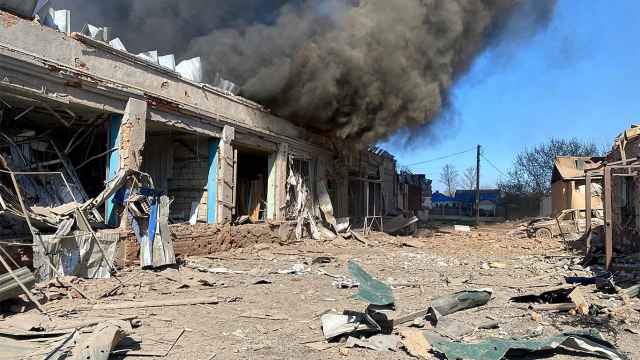A strange sense of deja vu is gripping Washington these days as the debate over ratification by the U.S. Senate of the New START treaty with Russia heats up. Spats have broken out between the administration of President Barack Obama and future presidential contenders, senators, and arms control and defense experts. There may not be nostalgia for the Cold War in any of this, but much of that era’s mindset can be perceived again in the arguments being knocked about.
The Senate must decide whether New START enhances U.S. security. Unfortunately, whatever the decision — which has been delayed perhaps until late fall to allow the Obama administration more time to muster support for the treaty — the U.S. and Russian governments will continue to place each other in the nuclear crosshairs for the foreseeable future.
New START builds on a legacy of strategic nuclear arms limitation that goes back to the 1970s. Former U.S. Secretary of State Henry Kissinger captured the allure in recent testimony: “The subject of nuclear arms control grew out of the seemingly paradoxical effort of those who had created the largest and most destructive arsenals to avoid by negotiation the ultimate consequences of their own decisions.”
Over the years, “avoiding … the ultimate consequences” through limitations butted against the bitter legacy of the surprise attacks suffered by both the United States and Russia in World War II. After the war, each adopted a “never be surprised again” policy and invested trillions of dollars in a multitude of hardened, mobile and concealed nuclear weapons to deter the other. The result produced tens of thousands of nuclear warheads. In time, strategic arms control treaties became the measure of the political relationship.
With the Soviet Union’s collapse, a unique opportunity to end the nuclear competition emerged. While elimination did take place in the former Soviet republics, the Kremlin hung on to its nuclear arsenal — the last vestige of Russia’s former superpower status. Likewise, U.S. administrations have remained wedded to the bomb. As a result, the “nuclear hostage” relationship of the Cold War continued, capped in 2002 by the Strategic Offensive Reduction Treaty, which set the upper limit on warheads at 2,200 by 2012.
In spring 2009, speaking in Prague, Obama advanced a bold ambition: a world without nuclear weapons. But his audacity confronted a world in which the bomb remained at the heart of many countries’ deterrence strategies. Obama muddled his message further by admitting that he did not expect to see abolition in his lifetime.
Nonetheless, New START marks a step in the direction of disarmament. It would limit each country to 1,550 strategic warheads on 700 deployed delivery vehicles. Verification relies on 18 on-site inspections, notification of forces in and out of service, missile-test flight information and other data exchanges, plus a consultative commission to iron out compliance.
Were the Senate to fail to ratify New START, the treaty’s proponents argue that the United States would lose predictability about Russia’s nuclear activities, resulting in greater distrust and risk of miscalculation, making both sides less secure. But arms control skeptics take issue with this. Throughout the Cold War, they viewed restraints on U.S. development and fielding of nuclear weapons as compromising national security. Fears that the Soviet Union would cheat reinforced their position. And cheating did indeed upset the broader superpower relationship. Today, similar apprehensions stoke opposition to New START.
To allay such concerns, the Obama administration committed to a multi-year increase in the budgets of the U.S. military’s nuclear weapon laboratories. And in the April 10 release of the Nuclear Posture Review, the Obama administration warned nuclear-armed states and others tempted to violate the Nuclear Nonproliferation Treaty that they would remain nuclear targets.
Missile defense has become another bone of contention. The language in the preamble to New START states that the agreement will not “undermine the viability and effectiveness of the strategic offensive arms of the parties.” Critics contend that the clause, along with the Kremlin’s implied warning that it could withdraw from the treaty unilaterally were U.S. defenses to become too robust, provides the Kremlin with leverage to impede deployment of any strategic missile defense system.
The Obama administration repeatedly denies such claims, along with others that the treaty’s verification provisions remain insufficient. It scoffs at assertions that Russia would cheat by multiplying warheads on bombers or new rail-based missile carriers, arguing that the Kremlin would want to avoid a compensatory response from the United States.
But Obama’s team does concede one point: New START fails to curtail Russia’s large numerical advantage in tactical nuclear weapons. Arguing that short-range devices pose no risk to the U.S. homeland, negotiators plan to press for reductions in follow-on talks.
Despite the claims by both the Bush and Obama administrations that Russia and the United States are no longer adversaries, it seems that the rapprochement has not translated into elimination of mutual nuclear targeting. The result, even if New START is ratified, should satisfy no one.
Bennett Ramberg served in the Bureau of Political-Military Affairs in the administration of former U.S. President George H.W. Bush. He is the author of several books on international security. © Project Syndicate






